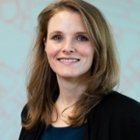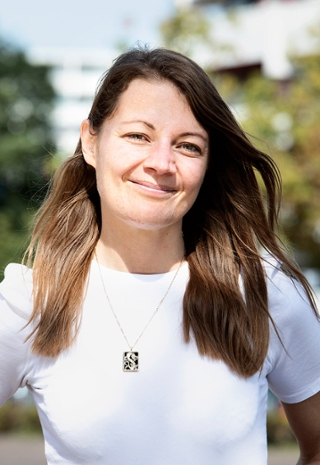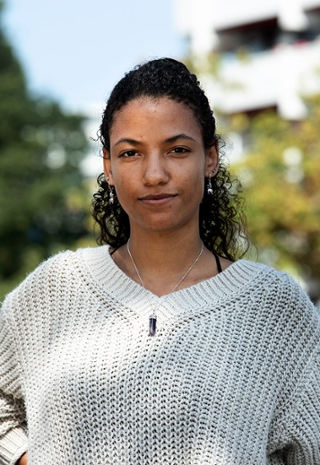
'Parents rarely dare to speak up'
How do you get parents from different backgrounds to talk to each other in the neighbourhood?
At the Amsterdam University of Applied Sciences (AUAS), we work with organisations and companies on the major social issues of today and tomorrow: sustainability, digitalisation and diversity. As good as that sounds, what exactly does it mean?
Amsterdam Zuidoost is home to people from many different backgrounds, and values and standards relating to parenting vary widely. Sanne Rumping, researcher in the Youth Care research group of the Faculty of Social Sciences and Law is developing a tool with welfare partners to initiate dialogue between parents about parenting issues in the neighbourhood.
The neighbourhood children grow up in plays an important role in their development. When the neighbourhood children live in has a positive influence on their development, we call this a good parenting climate. Parents, teachers, youth workers, neighbours, and volunteers ideally all participate in creating that climate, but research shows that it doesn't happen spontaneously and the process needs a little help.
Parents and professionals don’t always know how to open the dialogue about parenting situations. Oftentimes they want to correct other people’s children when they do something that is not allowed, or even just help them. But they don’t always know how to go about it.

Dialogue between parents for a better parenting climate
“In the early 2020s, the district of Zuidoost asked us whether we could research effective ways to work on the parenting climate in the neighbourhood,” says Rumping. To create a good parenting climate, it is essential that parents engage in dialogue with each other. “We first looked at how people respond to parenting situations on the school playground, and in other places such as local playgrounds and on the street. We saw that parents would regularly want to speak to other people’s children about what is and is not allowed, or to help them. But they didn't always know how to go about it, or didn’t dare.”
Rumping started off by collecting a number of existing methods and tools and analysing the important elements from them. She then worked with practice partners Swazoom (welfare organisation in Amsterdam Zuidoost), Trias Pedagogica (expert agency on parenting, intercultural parenting and fatherhood) and welfare foundation Dock and with other scientists to test whether these methods work in practice.

Increasing equal opportunities
Lisa Harinck (head of Policy, Quality & Innovation at Swazoom): “increasing equal opportunities among children is one of our most important tasks. Having a good foundation is important in this respect. We are always looking for new ways to improve the parenting climate in the neighbourhood. This project is very useful in that respect.”
We are always looking for new ways to improve the pedagogical climate in the neighbourhood
After testing the information gathered from the practice partners, a prototype tool was developed: an interactive PowerPoint presentation that shows various parenting situations in comic form with the aim of getting parents to talk to each other about these situations.
Rumping asked the practice partners to test the tool. “I let them decide how and where to do that. This resulted in many great stories, and: the pictures turned out to spark good conversations.” The feedback received was used to create a new version of the tool, ready to be tested again.

Alternative testing round
Students Oceanna Kersting (Applied Psychology) and Ceriese Cranendonk (Cultural and Social Development) got involved in the project through the Youth Care minor. “We were supposed to participate fully in the second testing round with the practice partners. Unfortunately, the coronavirus put a stop to that,” said Oceanna. So what could they do? Ceriese: “Sanne asked us to head out to playgrounds and parks and ask the parents there what they saw in the pictures; did the message come across? We also asked them what they thought of the form, and whether they would prefer something different.”
The parents did not find all of the pictures clear and they relayed that using more text would improve clarity. They found pictures with dilemmas very interesting, as well as situations in which a choice had to be made and/or action was required. Parents also stated they would like to use the tool in a preventive capacity.
Tool and card game in use after the summer
The final improvements are now being made. The practice partners contributed twelve new parenting dilemma's, and recommended developing a card game so that parents can actively engage with the material. Rumping: “The practice partners will start using the tool and the card game after the summer [2021]. I’m going to observe how they’re used and collect feedback from the parents. We’ll complete the project by the end of this year.”
Harinck is looking forward to working with the tool, which can be used in one-on-one conversations as well as in workshops for groups. “It will help us identify new trends and developments for us to work on, and advise on possible solutions for the future in consultations with partners and the municipal authorities.”
Did the students learn much in this project that they do not learn in their courses? Ceriese: “Yes, quite a lot. Cultural and Social Development does cover youth care in the first year, but I’ve had quite a bit of in-depth theory now. Interviewing the parents was a valuable experience for me. After I graduate, I want to work with young people and will also have to deal with parents and other external parties.”
It found it very interesting to learn from parents how they deal with their own children and those of others
Oceanna also wants to work with young people in the future, including those with problems. “Parenting is an important topic in youth work. It found it very interesting to learn from parents how they deal with their own children and those of others.” While she also carries out research in her degree programme, she says “this research was really next level. We really worked independently and because of the corona restrictions we had to go out and gather information. This experience helps me be better prepared when I enter the field.”
